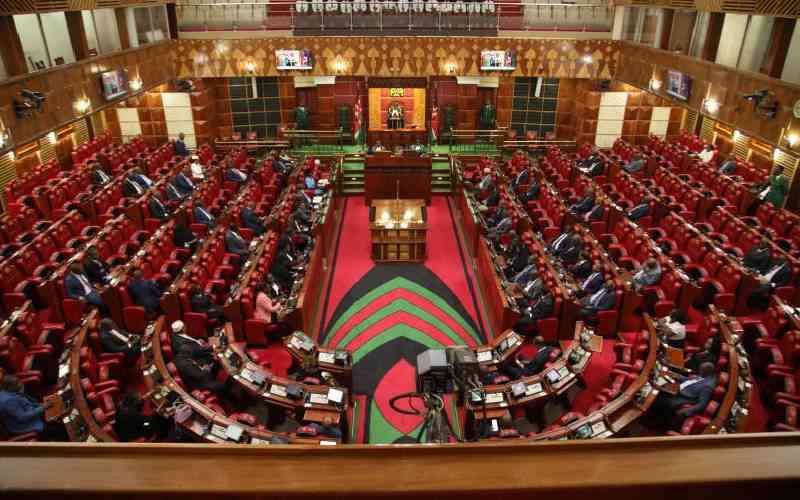
If you enter into a marriage planning to walk out with half of what your partner laboured to acquire once the union is dissolved, think twice.
A Court of Appeal judge has said that although the Constitution recognises equality between a man and a woman in marriage, this does not gurantee 50-50 sharing of matrimonial property.
Justice Patrick Kiage, while delivering a judgement in an appeal where a separated couple was fighting over property, said that once their love life is over, each marriage partner should walk away with the share of what they contributed.
He noted that marriage is not a ticket to equal sharing of matrimonial property.
The court ruled that if one partner invested nothing in marriage, they should not ask for a slice of what was invested by the other partner on the basis of love.
“The reality remains that when the ship of marriage hits the rocks, flounders and sinks, the sad, awful business of division and distribution of matrimonial property must be proceeded with on the basis of fairness and conscience, not a romantic clutching on to the 50:50 mantra,” said Justice Kiage.
The court ruled that sharing matrimonial property after a marriage hits the rocks does not have a fixed formula in the law.
“It is not a matter of mathematics merely, as in the splitting of an orange in two for, as biblical Solomon found, justice does not get to be served by simply cutting up a contested object of love, ambition or desire into two equal parts,” he said.
The judge, in a seven-page ruling, said it was bizarre to think a married woman’s or man’s legal rights equated to a permit to 50 per cent of the wealth without considering individual contributions.
He said the thinking behind equal share in marriage was woven to convert honest people into gold diggers, pleasure lovers and marriage-hopping brides and grooms.
Kiage said the Constitution was not a safe haven for spouses who refused to put effort into their marriages.
“Our new constitutional dispensation is no safe haven for spouses who will not pull their weight. It cannot be an avenue to early riches by men who would rather reap from rich women or women who see in monied men an adieu to poverty,” said the judge.
He also pointed out that there was nowhere in the law indicating that husbands and wives had equal rights, including half of the property.
WASTEFUL SPOUSE
“I do not think that getting married gives a spouse a free-to-cash cheque bearing the words ‘50 per cent’.”
The judge noted that although many marriages were built on happiness and mutual support, others were traps engineered to milk each other to the extent they felt buried inside sterile graves.
He gave the scenario of an unco-operative, wasteful spouse who was so distant that he or she hardly provided the warmth of companionship - which can be argued to be a non-monetary contribution to matrimonial property.
“In such an instance, it may well be that the one spouse achieved all they did and acquired not because, but rather in spite of their lazy, selfish, wasteful, wayward, drunken or draining mate. In such circumstances, an assessment of the inauspicious party’s non-monetary contribution may well turn out to be in the negative; the account in debit,” the judge said.
Kiage said each case should be determined in terms of how each party contributed and an appropriate percentage of the matrimonial property apportioned.
“No 50-50philosophy would grant such a party any right to property acquired without their contribution and notwithstanding their negation or diminution of the efforts towards its acquisition,” he said.
The judge made the ruling alongside justices Philip Waki and Festus Azangalala.
 The Standard Group Plc is a multi-media organization with investments in media
platforms spanning newspaper print operations, television, radio broadcasting,
digital and online services. The Standard Group is recognized as a leading
multi-media house in Kenya with a key influence in matters of national and
international interest.
The Standard Group Plc is a multi-media organization with investments in media
platforms spanning newspaper print operations, television, radio broadcasting,
digital and online services. The Standard Group is recognized as a leading
multi-media house in Kenya with a key influence in matters of national and
international interest.
 The Standard Group Plc is a multi-media organization with investments in media
platforms spanning newspaper print operations, television, radio broadcasting,
digital and online services. The Standard Group is recognized as a leading
multi-media house in Kenya with a key influence in matters of national and
international interest.
The Standard Group Plc is a multi-media organization with investments in media
platforms spanning newspaper print operations, television, radio broadcasting,
digital and online services. The Standard Group is recognized as a leading
multi-media house in Kenya with a key influence in matters of national and
international interest.










